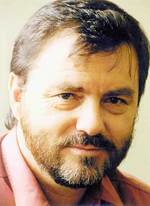Ernie Tuck honoured
 Mathematics Mathematics
A new fellowship will continue the legacy of one of the University of Adelaide's most talented and inspiring mathematics professors. Emeritus Professor Ernie Tuck was known internationally as an expert in fluid mechanics. A professor at the University of Adelaide from 1974 until his retirement in 2002, Ernie died in March after a long battle with cancer. He was aged 69. Born in Adelaide on 1 June 1939, Ernest Oliver (Ernie) Tuck was an undergraduate student at the University of Adelaide from 1956-1959. He received his First Class Honours Degree in Mathematics in 1960, supervised and mentored by Professor Ren Potts. After completing his Honours degree, Ernie won a Legacy Scholarship to study at the University of Cambridge. Ernie was both proud and grateful for this opportunity provided by Legacy, and remained strongly attached to Cambridge throughout his life. Ernie's career-long focus on ship hydrodynamics and related fields is believed to be partly attributable to his observations on the long voyage to England, and to a deep inquisitiveness in science, technology, and engineering applications. After receiving his PhD at Cambridge, Ernie took positions at the David Taylor Model Basin, a US Naval Laboratory, followed by the California Institute of Technology. In December 1967, Ernie and his family returned to Australia where he took up a Readership at the University of Adelaide. In 1974, at the age of just 34, Ernie was promoted to a Personal Chair. On the retirement of Professor Ren Potts in 1990, Ernie then became the Chair of Applied Mathematics and also the Elder Professor of Applied Mathematics. He held those positions until his retirement in June 2002. During his time in Applied Mathematics he frequently held the position of Head of Department and he was also Dean of the Faculty of Mathematical and Computer Sciences from 1993-1996. On his retirement he was awarded the title of Professor Emeritus. Ernie's primary field of expertise was fluid mechanics. He worked on a wide variety of topics related to ship hydrodynamics, aerodynamics, acoustics, bio-fluid mechanics, and numerical analysis. His research was characterised by the recognition of new or unsolved problems, application of novel mathematical methods, and careful numerical analysis. Ernie's research achievements were widely recognised in a number of ways. In 1988 he was elected a Fellow of the Australian Academy of Science and, in 1996, a Fellow of the Australian Academy of Technological Sciences and Engineering. Being a Fellow of both academies is a rare distinction and a recognition of Ernie's success in both scientific work and in application. Ernie was selected as the Georg Weinblum Memorial Lecturer for 1990-1991. In 1999 he was awarded the Thomas Ranken Lyle Medal from the Australian Academy of Science, which is awarded once every two years and recognises outstanding achievement by a scientist in Australia for research in mathematics or physics. In 1999 he was also awarded the ANZIAM Medal by the Australian and New Zealand Industrial and Applied Mathematics (ANZIAM) society, a division of the Australian Mathematical Society. In 2001 Ernie was the proud recipient of a Centenary Medal from the Federal Government. During his time at the University of Adelaide, Ernie successfully supervised 25 PhD and four research Masters students. Ernie will be remembered as a brilliant Australian mathematician and a caring and fun-loving man. He will be missed by many. To honour Ernie and continue his legacy, friends and colleagues from around the world are establishing the Tuck Fellowship. The fellowship will support the participation at conferences by students and younger research workers, which is something Ernie fostered throughout his lifetime. The fellowship is associated with the International Workshop on Water Waves and Floating Bodies (IWWWFB), an annual conference at the heart of Ernie's research interests and with an emphasis on participation of young researchers. Under the fellowship, one student or young researcher will be funded to attend this workshop each year, with applications to be accepted from eligible people right across the globe. Donations to the University of Adelaide to establish this fellowship are currently being sought. Donation forms can be found at the following websites: www.maths.adelaide.edu.au www.iwwwfb.org/tuck.htm Contributed by Elizabeth Cousins, Peter Gill, Nick Newman and Yvonne Stokes
|





